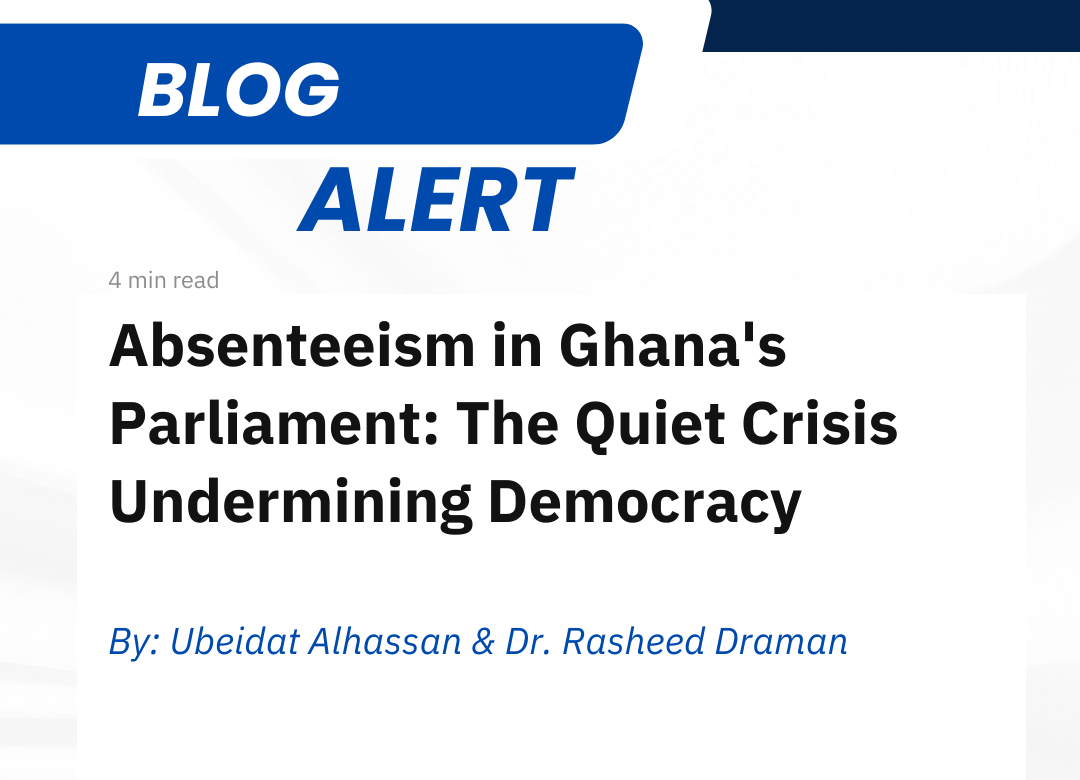By Ubeidat Alhassan (EPL Fellow), ACEPA and Rasheed Draman (ED), ACEPA
We voted. They took the oath. We expected them in the chamber – debating, lobbying, and working on our behalf. But too often, the seats are empty. This isn’t just about poor attendance; it’s a silent crisis eroding the foundations of Ghana’s democracy.
An Empty Seat, A Broken Promise
Absenteeism in Parliament isn’t merely a scheduling issue – it’s a breach of duty. Parliament is the engine of Ghana’s legislative process. It is where bills are introduced, scrutinized, debated, and passed into law. It is also the space where executive ministers present policies, respond to queries, and are held accountable by elected representatives.
Simply put: Parliament is not a place to be skipped without a valid reason.
Yet despite repeated public concern, absenteeism has persisted across successive Parliaments. Many Ghanaians, including fellow MPs, have voiced frustration – but little has changed.
The Constitutional Duty to Attend
The 1992 Constitution of Ghana is clear. Article 97(1)(c) states:
“A Member of Parliament shall vacate his seat in Parliament… if he is absent, without the permission in writing of the Speaker, and is unable to offer a reasonable explanation to the Parliamentary Committee on Privileges, for fifteen sittings of a meeting of Parliament during any period that Parliament has been summoned to meet and continues to meet.”
While it doesn’t mandate MPs to attend every sitting, the Constitution clearly positions attendance as a non-negotiable responsibility. Unexplained absences violate this trust and disrespect both the legislative process and the citizens MPs are meant to represent.
The Numbers Don’t Lie
According to parliamentary monitoring organization Odekro, between 2016 and 2024, Ghanaian MPs missed an average of 1 in every 4 sittings – a staggering 20–25% absenteeism rate. In some years, only a handful of MPs attended all sittings, while many exceeded the constitutional limit of 15 absences.
The Constitution (Article 102) stipulates that a quorum for business is met when at least one-third of MPs – 92 out of 276 – are present (excluding the Speaker). Too often, even this basic threshold isn’t reached, causing legislative delays and wasted public funds.
When Absenteeism Disrupts Governance
Absenteeism has had tangible, harmful effects:
- November 2015 – Parliament was forced to postpone debate on the national budget due to lack of quorum.
- March 2022 – MP Alhassan Suhuyini raised a quorum issue during a critical Roads and Highways Ministry session.
- June 2023 – Just 14 MPs were present during active campaigning for the Assin North by-election.
- 2024 – The late Hon. Murtala Mohammed criticized the Majority caucus for prioritizing presidential campaign events over Chamber attendance.
- 8th Parliament – MPs Henry Quartey, Sarah Adwoa Safo, and Kennedy Agyapong were referred to the Privileges Committee after exceeding the 15-day absence limit. None lost their seats.
When Absence is Respectful
There are justifiable reasons for MPs to miss sittings – official assignments, health emergencies, bereavement, or legitimate constituency work. In these cases, requesting permission upholds decorum and respect for Parliament and the electorate.
What erodes trust is when MPs vanish without explanation – silently skipping sessions as though their presence is optional. It isn’t.
Privileges Committee: A Watchdog with Blunted Teeth
The Privileges Committee is tasked with investigating absentee MPs and recommending sanctions. But their effectiveness has been widely questioned. In 2022, three MPs were referred for excessive absenteeism. None faced constitutional penalties. Why? Political compromise too often supersedes constitutional accountability.
This lack of enforcement makes absenteeism a risk-free habit.
Why This Matters
Parliamentary representation is not ceremonial – it’s functional. A persistently absent MP fails to serve the people and betrays public trust.
The reality is simple: an absent MP is a silenced constituency.
Making Accountability Non-Negotiable
Effective oversight begins with demanding regular, physical presence in Parliament. MPs should not attend at the “whim” of the Speaker but must see attendance as core to their mandate.
If Ghana wants a serious Parliament, it must institutionalize serious accountability.
Proposed Reforms
- Mandated Roll Calls
Under new Standing Orders (Order 14), daily roll calls – manual or electronic – must be logged as proof of attendance. - Public Attendance Scorecards
Civil society should publish quarterly MP attendance records to name and shame habitual absentees. - Media Watchdogs
Encourage regular “MP Tracker” features, especially during election seasons. - Tie Allowances to Presence
Sitting allowances must only be paid after verified attendance. Consider penalty deductions (e.g., 15% monthly cut) for chronic absenteeism. - Biometric Verification
Introduce real-time biometric or digital attendance systems linked to MPs’ ID cards or tablets to eliminate proxy sign-ins. - Live Roll Call Broadcasts
Occasionally televise roll calls. Let citizens see who shows up – and who doesn’t. - Stronger Sanctions
New attendance rules are pointless without meaningful, consistent enforcement by the Privileges Committee.
- Proposal for Reforming the Privileges Committee
Consideration should be given to reforming the Privileges Committee to include both Members of Parliament and non-parliamentarians. Historically, the Committee has faced difficulties in exercising the impartiality and resolve required to address matters involving its own members.
Conclusion: Democracy Erodes One Empty Seat at a Time
Parliament isn’t a courtesy appointment. MPs are elected to work, not to vanish. Absenteeism is no longer a procedural inconvenience – it’s a democratic threat.
Citizens deserve a Parliament that shows up. The only question is whether Ghana will demand it.

